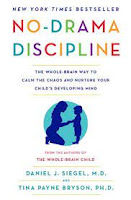My wife and I have two children (seven and five years old as of the time of writing this review). As with all parents, we struggle with bathtime, bedtime, playtime, homework, and the developmental challenges those situations often entail for small children. For the past couple months we’ve really been struggling with our youngest. At any moment, any time, and sometimes multiple times per day she has intense, emotional breakdowns. Tears, anger, shouting, name calling, hitting, breaking things, throwing things, doors slamming—the whole bit. Not liking how I was personally handling these situations, feeling that I had some negative influence in how they were turning out, I decided to do some research. Why were my methods not producing the desired effect? I found No-Drama Discipline: The Whole-Brain Way to Calm the Chaos and Nurture Your Child’s Developing Mind (2014) by Daniel Siegel and Tina Payne Bryson. Thank goodness for this lighthouse in the storm.
The answer to my question: love. I laugh. Of course I love our children, but it’s a matter of perspective and timing. I will not steal Siegel and Bryson’s thunder, nor do their book the dishonor of boiling it down to bullet points. But I can say the philosophy of No-Drama Discipline derives from empathic love, and how we communicate that through understanding and learning in our children’s most difficult moments. Key example: an emotional breakdown is not a moment to lay down the law, rather a moment to model and teach.
For people who are worried No-Drama Discipline purports a 21st century ultra-liberal, we-accept-everything model for parenting, fear not. The book strikes a keen balance between too strong a disciplinary approach, and too light. Unlike liberal parents who might allow their child to do anything believing they will eventually learn, or conservative thinking which might be too punitive and short-sighted, No-Drama Discipline takes a different road. It’s a road leading through our common humanity but with clear limits. It’s not a cage, and it’s not the blank horizon. It’s an open field offering freedom, but with fences.
Taking the road metaphor a little further, No-Drama Discipline is the high road. It’s the long game. There is no magic switch which will produce desired behaviors. Instead, the book promotes persistence and consistency in the parent to see positive changes in the child, to understand nothing is perfect and problems will still exist. But to get the majority under control and moving in a relationship positive direction is best for both parent and child.
And its also requires the parent to be self-aware, to understand themselves as they attempt to relate to a small person who doesn’t yet possess the skills to be self-aware themselves. In other words, to be self-aware on behalf of the child. This is difficult—the high road. Thus, be aware that following recipe may not lead to the cake desired without significant attention and effort to the details in every step. Nobody said it would be easy…
If I had any nit to pick, it’s that No-Drama Discipline can be repetitive. Certain sentences or ideas are repeated multiple times throughout the book. There are moments the reader can feel they are going in circles. That being said, advertisements clearly have a way of getting into our minds, so why can’t the book’s tenets be repeated with the hope of likewise taking root?
In the end, No-Drama Discipline is, at a minimum, worth a read for parents struggling to deal with their children’s emotional breakdowns and temper tantrums. It provides clear direction and practical examples for communications and behaviors that parents can readily and easily translate to their family environments. And less face it, the ideas in the book are not rocket science, but the execution of them can sometimes feel like the same amount of effort to build a rocket, and for that the book is extremely inspiring. For me personally, the book was a guiderail, a re-direction back onto the road of good parenting where I had been going off road through rough terrain unnecessarily. In one month, the extreme situations with our youngest have greatly reduced. Most importantly, I think she is a better person, and we have a better relationship. I know that is a mushy, sappy way to end this review, but it’s the truth.


No comments:
Post a Comment